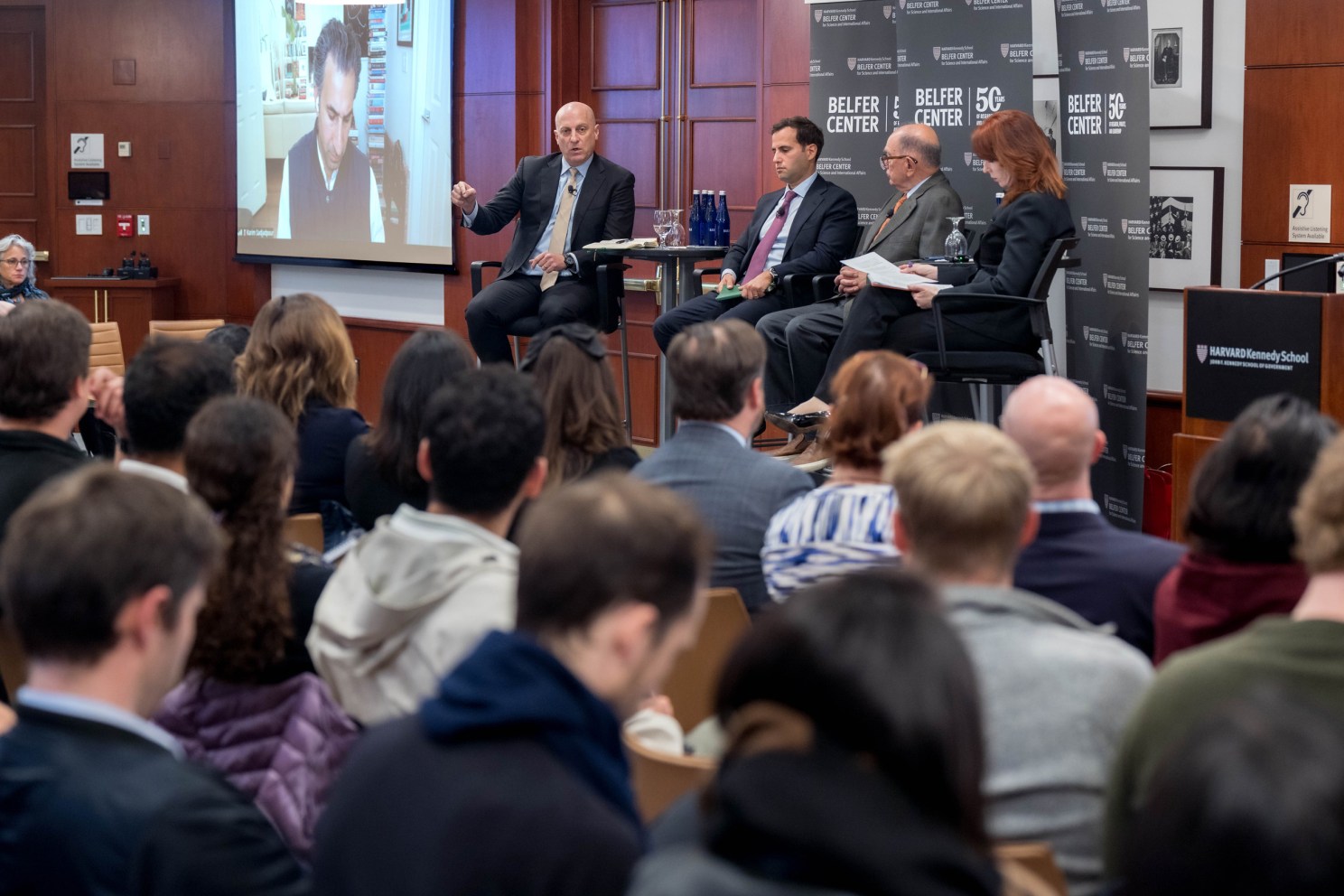
Panelists Karim Sadjadpour (on Zoom), Gidi Grinstein, Omar Rahman, and Edward Djerejian with moderator Meghan O’Sullivan.
Benn Craig/Belfer Center
What are the risks of wider Middle East conflict?
Kennedy School scholars examine spread of Gaza war to include Hezbollah, Iran
A year ago, a terrorist attack on Israel by Hamas sparked the war in Gaza, which has claimed tens of thousands of lives and recently begun to spread to Lebanon and Iran. What happens next?
Scholars at the Harvard Kennedy School came together Monday to discuss the risks of further escalation in the Middle East in a panel led by Meghan O’Sullivan, director of the Belfer Center for Science and International Affairs at HKS.
“It is a day of remembrance for many who lost loved ones a year ago today in the terrorist attacks by Hamas and those who lost loved ones in the many, many deaths that have occurred since that time,” said O’Sullivan, who is also Jeane Kirkpatrick Professor of the Practice of International Affairs. “It’s a day of mourning for many people who are still losing members of their families and loved ones.”
A major point of discussion revolved around the role of Iran, a longtime opponent of Israel, in the ongoing conflict. Last week, Iran launched a major ballistic missile attack on Israel — only the second time the country has been directly attacked by Iran. Iranian officials said the action was in retaliation for the killing of a Hamas leader by Israel in Tehran in July. Israel has not claimed responsibility for the death.
The missile attack was widely viewed as an escalation between Israel and Iran, which has long actively supported Hamas in Gaza, Hezbollah in Lebanon, and smaller militant groups in the West Bank in conflicts with Israel.
“We’re facing a Middle Eastern crisis,” said O’Sullivan, who served in the George W. Bush administration as deputy national security adviser on Iraq and Afghanistan. “We have moved away from a decade-long war between Israel and Iran by proxy to a place where now Israel and Iran are in conflict with each other directly.”
The panel featured Edward Djerejian, a former U.S. ambassador to Israel and current a senior fellow at Harvard’s Middle East Institute; Gidi Grinstein, an Israeli entrepreneur and former peace negotiator under Prime Minister Ehud Barak; Karim Sadjadpour, an Iranian-American policy analyst at the Carnegie Endowment for International Peace; and Omar H. Rahman, senior fellow with the Middle East Council on Global Affairs.
For more than an hour, the panelists discussed Israel’s strategy as the dominant military power in the region, Iran’s involvement, and what America’s role is — and may become.
“What [Israel] has done in terms of degrading Hamas’ capabilities and decapitating Hezbollah’s leadership, these, in my eyes, are brilliant tactical victories,” Djerejian said. “But what about the day after?”
Israeli Prime Minister Benjamin Netanyahu has said his goals are to demilitarize and de-radicalize the opposition in Gaza, but his actions don’t align with those aims, Djerejian said.
“He’s defined the Israeli military movements in Lebanon to change the balance of power on the northern border of Israel. But these are not a strategy. These are mostly tactics without resolving the key issues.”
Rahman was tougher in his assessment of Israel’s actions.
“You’re creating a bottomless pit of despair, trauma, anguish, anger, all the things that will feed the resistance for generations,” he said of the situation in Gaza. “And so Hamas is not going anywhere as an organization. Hezbollah is not going anywhere as an organization.”
He argued that the U.S., which has provided almost $18 billion in aid to Israel in the last year, must reconsider its role in the conflict.
“Does America want to continue underwriting an indefinite Israeli war on the region? Is that something we want to do with our taxpayer money and our support at the cost of our national interest, our credibility, on the international stage?” he said.
Grinstein said that the conflict could end immediately if Hamas were to surrender.
“I do want to say and acknowledge that our tragedy creates a challenge of compassion,” he said. “To look at the other side and feel their tragedy as well, because there is an unimaginable tragedy happening in Gaza. Here could be an easy solution for this war, which is for Hamas leadership to leave Gaza and end the war.”
As for the likelihood of Iran relenting, Sadjadpour said that it’s unlikely.
“I don’t think we’re ever going to see meaningful peace and stability in the entire Middle East until you have a government in Iran, I won’t say democratic, but whose organizing principle is not the revolutionary ideology of 1979 but the national interest of Iran.”
For more information, including a transcript of the event, visit the Belfer Center website.





